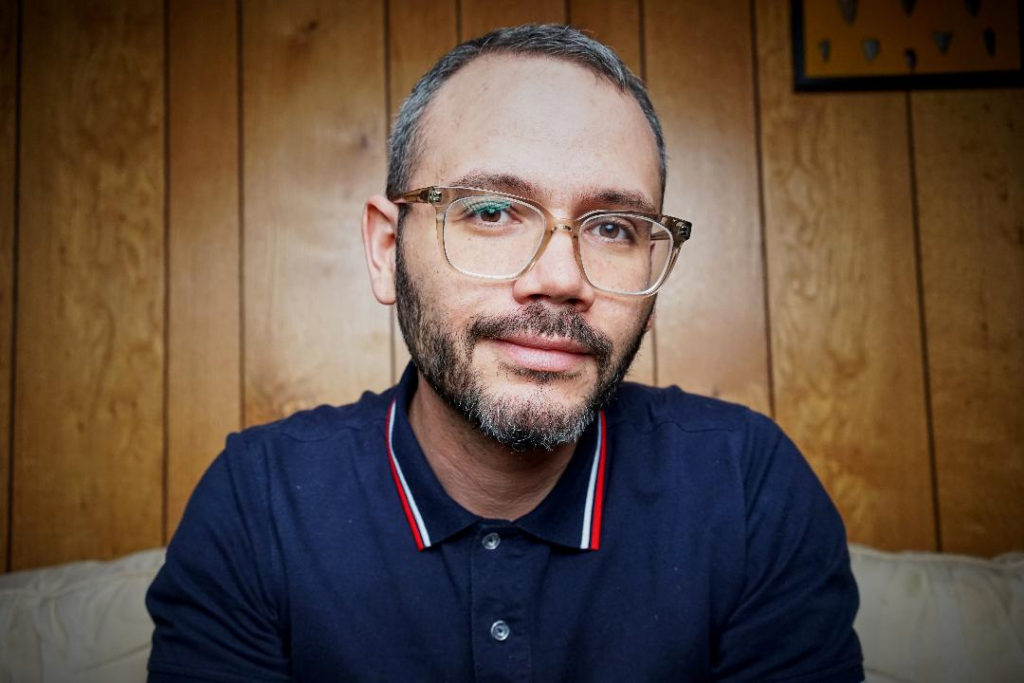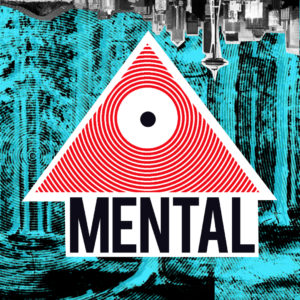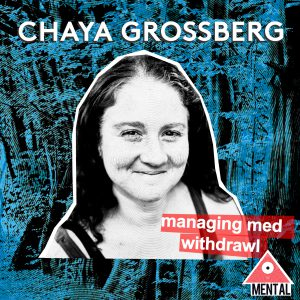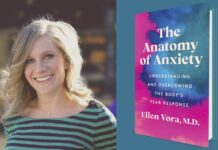I met Jesse Zook Mann a few years ago when I was living in Olympia, Washington, first on Twitter, then in person when he interviewed me for his podcast. Besides being a successful filmmaker and patient advocate, Jesse is a Twitter master.
He may not know it, but Jesse inspired me to even use my Twitter account, which I had been using only for automated reblogging as I had never found any other use for it. But Jesse has over 50,000 Twitter followers (when we met I think he had around 30k which was already impressive).

Jesse regularly engages all kinds of people on Twitter about topics like suicide, trauma recovery, and self-care. You can follow him at @zookmann to see his threads which often have people from all places on the spectrum of psychiatric survivors responding.
I started to see how to connect with other psychiatric survivors and trauma survivors on Twitter and found a lot more by following Jesse’s threads. A lot of people in psychiatric drug withdrawal support each other online and Twitter is no exception. Finding the more popular psychiatric survivor accounts is a good way to connect with more of us. Unlike Facebook, on Twitter, as you may know, it is normal to follow and connect with people who share a common interest, whether or not you know each other or have mutual friends.
One thing about Jesse is that he was severely harmed by psychiatry, and also uses language that reaches people who identify with the mainstream paradigm of mental health and mental illness. Jesse and I don’t always agree about terminology (we have a discussion of this and other topics connected to psych drug withdrawal on our podcast interview here), yet his language reaches many people who need his message: that it is possible to recover from trauma and the harms of psychiatric drugs and there are so many different options available.
In Jesse’s words, “You have to meet people where they’re at,” and he does this on his Twitter feed. Here is my interview with Jesse:
* * *
Chaya Grossberg: What led you into the mental health system to begin with?
Jesse Zook Mann: I was working in television production and doc film, an industry where 18-hour days are normal. Where not eating regular meals is normal. Where I slept on planes and neglected my basic needs for a decade. And then I had one stint where I was producing VICE’s first original television and flying to Russia and embedding with literal serial killers and then flying to the West Bank to work with Palestinian car thieves, then at the same time directing an independent film Punk Jews, and another film where I was embedded with a depressed musician for months, and in the middle of all of that I lost everything I owned in a flood in Brooklyn.
I was exhausted and in pain, but who wouldn’t be! Anyway, I went to a psychiatrist and received a bipolar 2 diagnosis and within six months I was put on a dozen meds. They totally disabled me mentally, physically and in every way I can imagine.
CG: If you could go back, how do you wish you were treated and what do you wish you had been told from the beginning?
JZM: At this point I wouldn’t change anything, and know I am better for living this path now. My journey where I endured such extreme suffering has transformed me into a better person and given my life emotional depth and an intense empathy I didn’t have before I got sick. But I was incredibly lucky to find treatments that work on my own, and I came very close to not being here today.
What would have sent me in a different direction from the beginning would have been to get an education in trauma recovery at an early age instead of going to self-help seminars to treat my depression. Doing self-help put me on a wildly bad road that taught me my symptoms weren’t real, and I went from self-help to crisis to a very bad psychiatrist. If I knew how crucial it would be to get a proper referral for a psychiatrist I probably would not have come so close to death.
CG: What were the worst effects you experienced from taking your medication as prescribed?
JZM: I was physically disabled after a few months of meds. I was totally dissociated. I couldn’t tell if I was sleeping or awake for years. I went from being a relatively healthy man who carried a camera on his shoulder for 12 hours a day, who traveled the world, to having trouble walking and intense muscle spasms. I couldn’t sleep more than three hours at a time for the better part of a decade. I had regular panic attacks and rage for the first time in my life.
My first three doctors told me it was just my bipolar disorder getting worse but it was really the side effects from the meds. I mean, I didn’t get any lasting regular effects. They all made me worse after a week or so.
CG: What was the biggest lesson you learned from your experiences with psychiatry and the mental health system?
JZM: I learned that there are doctors who can look legit who can have no idea what they are doing and can make you worse. I also learned that there are a few great doctors dedicated to pushing the field forward who are enormously selfless people who love their patients and the field. Going to a psychiatrist is not like going to a heart surgeon or a mechanic. There does not seem to be any real standard or rules about using up-to-date information or giving patients informed consent or laying out all of the treatment options that might be available to them.
Some psychiatrists can help you find root causes of illness with consultations with diet, sleep, exercise; do blood tests to check for other diseases and work with other doctors, recommend trauma therapies… others will prescribe you a dozen meds in a manner of months and disable you without looking at any alternatives. The referral and research is so important in finding a doctor to trust. So getting a second opinion if treatment isn’t going well is crucial.
CG: You have contact with many other trauma survivors and psychiatric survivors. What are some common themes you’ve noticed in their struggles?
JZM: I think it’s fascinating that so many childhood abuse and neglect survivors cope in the same ways. People-pleasing. Charming. Workaholism. That we so often end up in relationships with hurt people who we obsessively try to fix. So much of our healing comes from nurturing ourselves and living a life of intention.
We talk a lot about #selfcare on social media and it has this trite kind of consumerist association, but I’ll tell you, self-care is the path for so many survivors to get their lives back. Every survivor I know who went from frequent hospitalizations to thriving lives like a monk with their own rules and is all-in with maintaining their health and well-being. And all of the people I know who are still lost don’t take self-care very seriously. Maybe they have a toe dipped in, but that doesn’t do it. Not usually. Not saying that is everyone out there, but that is what I see with my own eyes.
CG: What is your project Mental Health Media?
JZM: This fall I launched a platform called Mental Health Media designed to educate patients about all of the ways there are to recover from trauma. No patient should think that meds and talk therapy are the only options. All patients deserve access to all treatments that might work for them, and the first step to get there is to educate patients and clinicians that these treatments exist.
Eventually we will be making a film about the spectrum of options, and a book series, but now we have the podcast Mental Radio live with ten episodes available.
CG: What do you think this community needs most and how do you hope your platform will fill some of that need?
JZM: I think the landscape of media in mental health, like our mental health system, is mostly horrible. So much of what we see online and in the news is based around very simplistic mental health information, coupled with disempowering and cynical patient stories. How many patients are coming home from their first hospitalization and looking for information today? Thousands. And what are they finding? Out of date or overly simplistic information coupled with testimonials that if you tried a few drugs and talk therapy for a while and if it didn’t help that your life is basically over. I can’t tell you how pissed off that makes me.
I am creating work with the goal to help people find options to get their lives back to whatever degree possible. I want to help patients find the tools that will empower them to drive their own healing and their own recovery.
CG: What are your goals with your podcast? Who are you most trying to reach and how do you hope to inspire or help them?
JZM: I want everyone in the world to know that are so many treatment options that people use to get better. Everyone needs to know, because people need to know they have options before they get sick, and hopefully get help before they are in crisis. I don’t know if I can inspire anyone directly but I can talk about treatments that work and talk to patients who got better, so if people find Mental Radio at least they know they have options and that recovery is possible.
My end goal is to light a spark that brings a wave of education on how to heal trauma. I want that wave to stop the suicide crisis from getting worse and eventually to reduce the suicide rate across the country and around the world.
* * *
 Check out Jesse’s podcast which includes topics like med withdrawal, creating community, health and fitness, healing childhood trauma and surviving suicides of loved ones, and let him know what you think in the comments of this blog. Or find him on Twitter at @zookmann and join his conversations with other survivors.
Check out Jesse’s podcast which includes topics like med withdrawal, creating community, health and fitness, healing childhood trauma and surviving suicides of loved ones, and let him know what you think in the comments of this blog. Or find him on Twitter at @zookmann and join his conversations with other survivors.
Here’s his conversation about his podcast on Twitter.
















“So getting a second opinion if treatment isn’t going well is crucial.” Although not always helpful, if one is dealing with a likely pedophile pastor, and child abuse covering up, and profiteering, religion. The mainstream religions that have been bought out by the DSM “bible’ believers, and their, systemically, primarily child abuse covering up, by DSM design, theology. Which is the case for many of today’s mainstream religions, like my childhood religion. I’d be one of the many “widows” mentioned in the Preface of this book, but check out the chapter on evil, too.
https://books.google.com/books?id=xI01AlxH1uAC&printsec=frontcover&source=gbs_ge_summary_r&cad=0#v=onepage&q&f=false
As to the systemic child abuse covering up crimes, and profiteering, of both the psychologists and psychiatrists, here are a couple of articles. And a partial explanation of why our society has these systemic DSM encouraging child abuse covering up, pedophile empowering, problems.
https://www.indybay.org/newsitems/2019/01/23/18820633.php?fbclid=IwAR2-cgZPcEvbz7yFqMuUwneIuaqGleGiOzackY4N2sPeVXolwmEga5iKxdo
https://www.madinamerica.com/2016/04/heal-for-life/
https://www.psychologytoday.com/us/blog/your-child-does-not-have-bipolar-disorder/201402/dsm-5-and-child-neglect-and-abuse-1
No “mental health” worker today may EVER bill ANY insurance company for EVER helping ANY child abuse survivor EVER, unless they first misdiagnose ALL child abuse survivors. So today’s “mental health” industries are a systemic, primarily child abuse and rape covering up, group of “mental health” industries, by DSM design.
Let’s get rid of the systemic problems instead.
I should probably get on Twitter, thanks for article, Chaya. And thanks to Jesse. Boy oh boy, our scientific fraud based “mental health” workers really have been targeting the artists and creators for a long time, haven’t they? Attempting to proactively murder all the creators in a society is a recipe for how to destroy that society, but that is the DSM “bible’s” goal for too many “mental health” workers.
Too many “mental health” workers have odd delusions that artists are “w/o work, content, and talent,” or “unemployed,” since they don’t know what we’re doing. Oh, but when they bother to actually look at our work, they realize it’s “work of smart female,” and “insightful.” Or even “prophetic” and “too truthful.” The ignorant “mental health” workers need to stop trying to destroy, and/or steal from, all the intelligent designers and artists of America.
Report comment
“Mental health” enables and encourages the abuser in human relationships.
One MI worker confided that few were ever “diagnosed” with “narcissism” or “sociopathy.” Those labels are not legitimate diseases but there are some evil people who don’t care how they hurt others. Psychiatrists almost never call them out.
Shrinks like that kind of people because they dress well and have excellent social skills. “MI” workers and serve as the abusers’ gullible patsies or sometimes willing accomplices. They despise the weak and suffering–loving to grind them into the ground with their heels.
The men who drew up the DSM have no idea how human beings think, feel or behave. You could probably get a better idea of human behaviors from a computer working entirely from algorithms.
Psychiatry’s mission: To afflict the afflicted and comfort the comfortable.
Report comment
Rachel I think Narcissism was removed from the DSM, because they found out it serves some people well and makes them excel (which applies to psychiatry) I think psychiatry went, “oh crap, that disorder describes me, and a host of other selfish folks we better drop it”
They really want to see people who don’t do as well as a ‘narcissist’, because it is much easier to kick those who are down.
A few labels were dropped because of the way men and women are uniquely different, leading to certainly keeping the ones that apply to women. (and nope, not taking back that sexist comment) We cannot ignore the many diagnosis and treatments designed for women. Neurosis. In fact I think the modern politically correct thing is now to label men with the labels women were honored with. That having a purpose, because singling out women in modern day political correctness became suspicious. So what better way to make it seem authentic, than to include men also.
If psychiatry took into context all of a person, all of a gender, their ancestral roots, their hunter vs. gatherer fit, their fit within a stressful chaotic system whether family or society, or culture, it could no longer be a label.
I think psychiatry is not having a fun time anymore, it is a dull repetitive job, because now EVERYONE has an MI. They dabbled in this thing that has no end and that eureka moment came to them. Now they are stuck, and I think most likely hoping themselves for a change.
IF they had been cognizant of differences and helped those whose uniqueness caused them problems and helped, supported, validated the differences as a small part of a huge whole, instead of pathologizing, they would not be in the mess they are in.
They used to live a life without scrutiny, but that is no longer so.
In fact the public is very much waking up to the very “ills” within psychiatry. They know the feeling of being exposed and trying to hide it, defend it.
And no I do not have some grandiose delusions.
Report comment
Allan Frances and others have been trying to cushion the fall for themselves.
And also remove a few cards to steady the structure. But the whole house is bound to fall anyhow.
Report comment
Interesting perspective Something Else. It seems some people have an easier time fitting in to society’s prescribed frameworks. it can definitely be a struggle to be an artist in this world, yet like you say, we are so needed.
Report comment
Thanks Chaya,
A lot of identification with you Jesse In your historical plight. I remember a guy saying to me once that the only reason we survive, is to help other people survive.
It’s good to see you putting the public media system to a positive use. Like Someone else said – I must get on to twitter myself.
Thanks again for the Article.
Report comment
Thanks Fiachra. Yeah, twitter is pretty cool. Sometimes better than Facebook for certain things. Took me awhile to figure that out. Join us there if you’d like.
Report comment
The link is a typo, it goes to twiiter.com/zookmann and that doesn’t exist. You want twitter.com/zookman. You put two i’s rather than t’s
Report comment
Thanks for letting us know Nijinsky. Not sure if I have editing powers…
Report comment
I found this part worth repeating:
“We talk a lot about #selfcare on social media and it has this trite kind of consumerist association, but I’ll tell you, self-care is the path for so many survivors to get their lives back. Every survivor I know who went from frequent hospitalizations to thriving lives like a monk with their own rules and is all-in with maintaining their health and well-being.”
This has been my experience. I put myself to bed on time. I eat healthy, avoiding sugar and other junk foods. I meditate and practice gratitude and strictly control my environmental stimulation. I exercise as much as I can and get appropriate sunlight using the Army’s Vitamin D calculator. I avoid social media and toxic “bubble” environments that are highly conflictual and socially coercive. I do all of the self-care all the time. And it’s still hard. But it’s the only way.
I’ll be honest that the Mental Health Media site doesn’t appeal to me due to its overwhelming acceptance of DSM slurs by its authors, nor do podcasts about living with “bipolar” or any other label. I am sure there is a segment of the population who does believe they have a definable illness to treat who might find it helpful, but I really wish we could get away from the illness model and reframe to a distress and recovery model. As long as people think there is an illness to treat, the medical profession (and overall culture) will continue to place the origin of the distress inappropriately within the individual being “treated”.
Report comment
Kindredspirit, same here. I relate with that part about self care a lot also.
I agree with you too about the language, yet so many people use that language to describe their experience, so it’s good to have people who can speak that language AND talk about things in a nuanced way. It isn’t my framework either, yet so much of what Jesse shares still resonates with me..
Report comment
“It isn’t my framework either, yet so much of what Jesse shares still resonates with me..”
I understand that and I certainly admire the special kind of person it takes to bridge intense ideological divides like as exists between mainstream psychiatry/culture and the critical and anti-p camps.
Report comment
Yes, definitely. Sometimes it baffles me when people share my views so much on some things and not so much on others regarding psychiatry.
Report comment
Hi Chaya,
It was a great interview with Jesse. Thanks for your good work and for sharing all your wisdom and understanding with others snared by the same trap of psych drugs. Jesse also provides very helpful information regarding self- care. I will have to check out the book he mentioned “The Mood Cure” and I think he mentioned Holy Basil for sleep. I also liked what he said about “not to look for oranges at the hardware store”. Very true!
I agree with KindredSpirit though about not accepting labels or disorders. I always strived to remain positive through adversities and it wasn’t until I discovered harmful psych labels put on my records (during cancer treatment) that I sunk to a dark place for the very first time. It was unequivocally a delusional psychiatrist and her labelling that drove me there. As such I cannot understand how identifying with any psych label helps to recover from distress, trauma, burnout, sleep deprivation, poverty, etc. I also agree Chaya “how well you function in capitalism” does not determine if you have a disorder or not, and those appearing to have it all together or be “high functioning” are probably “barely hanging on”.
I opened a twitter account a few years ago but was not (somewhat) active until recently. It can be a source of information and a good way for psych survivors to connect and keep spreading the message.
Report comment
Thanks Rosalee. Sounds like you listened to the podcast which I appreciate!
I love holy basil/tulsi for calming and adrenals and people have found it helpful in psych drug withdrawal as well, along with my favorite, oatstraw.
I have never found labels or disorder language helpful myself either though sometimes I resonate with the idea of feeling “sick” whether long term or acutely for a short while. Not in a pathologizing sense like many people use it, but more like I have the flu. It’s weird how with mental illness labels “sick” sounds like a degrading insult to me. But I’m not sure everyone thinks of it that way. Either way I only find it useful to talk to myself that way and would never want that label put on me by anyone else.
Report comment
Just wish to draw attention to something. I’ve been involved in art for many years, am also classed as a ‘mental patient’ and have documented here and else where in detail what I’ve witnessed and been subject to over a number of years. You all know this.
There is a online submittal form on the Museum of Modern Art, New York website which ostensibly is ‘open’ to ALL… Here it is:
https://www.moma.org/collection/about/curatorial-departments/photosubmissions
As you can see there is no form there. So I ask a question to MoMA: when do you upload/open your form so I can fill it in ? I also give a link to the ‘About’ on my flickr account where I go into detail about Akathisia/Toxic Psychosis, history of psychiatry… All the abuse… You all know the picture.
There was no reply to my question. I ask a friend (also a psych survivor but they do not disclose this) to ask MoMA when they open this form… They get a email reply same day with specific instructions as to day of month, even time of day to be able to submit.
——-
RIP Julie Green
Report comment
Interesting streetphotobeing. There have been studies that show a knowing someone has a diagnostic label lowers compassion and contributes to dehumanization, less empathy for the person with a label’s suffering etc.
Report comment
I believe this.
Chaya, knowing this, why are there some people begging for labels? (Never wanted one myself.)
Report comment
Maybe for a sense of inclusion or camaraderie with others who have that label? Maybe so others will view them with compassion (it may not usually work that way, but in certain circles it does). It’s pretty easy to get a label though…can’t imagine needing to beg for one. What do you think?
Report comment
‘”Far away from the from the eloquent critiques from Mad in America, one is as likely to have a patient REQUESTING to be diagnosed or start a new medication.”
Dr. T.N. Tampiyappa
“The Matrix: Disentangling Antipsychiatry”
MIA 12/19
I have heard other psychiatrists say this. Though my label almost made me commit suicide before I decided to live above it.
FWIW I have known some people who enjoyed being able to turn over adult responsibilities to the mental system.
Report comment
Yeah, it’s hard to say because the mental health system can create a learned helplessness that reduces people’s confidence. That definitely happened to me.
I’m glad you were able to live above it and not kill yourself.
Report comment